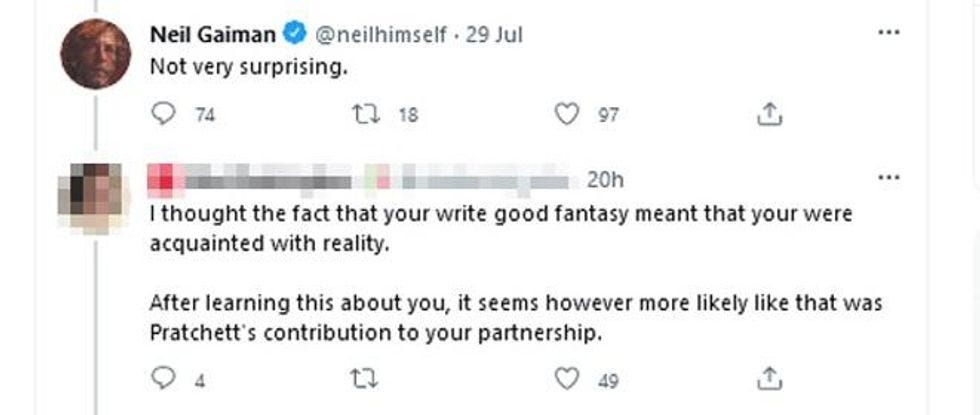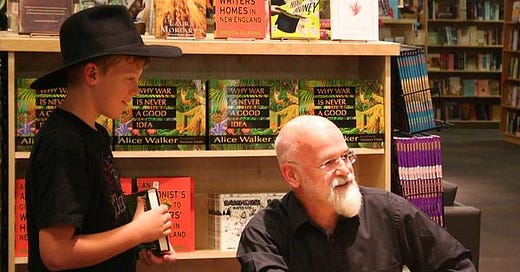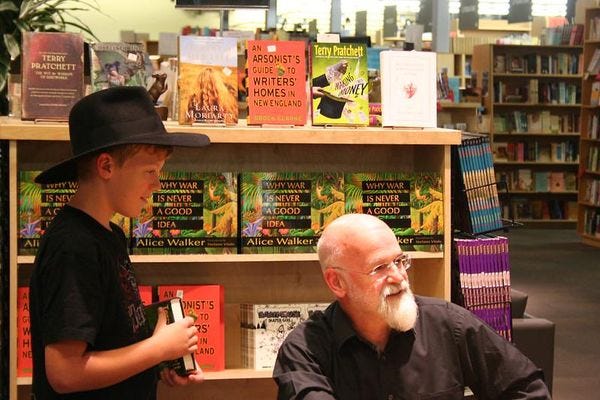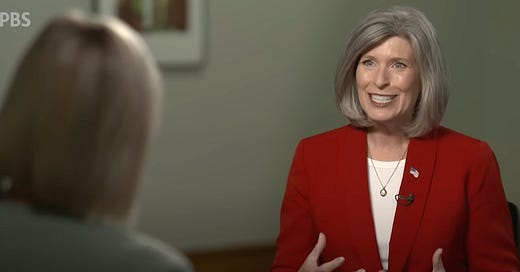
Let's Thank The Streisand Effect For All This Talk About Terry Pratchett And Transphobes
Sir Pterry was not one of them. And before Saturday, none had thought to claim him.
If you were on Twitter this past weekend, 1) you should probably find better uses for your time, and 2) you may have seen something about transphobes who supposedly claim Sir Terry Pratchett, the brilliant satirical fantasy author who died in 2015, was some sort of anti-trans icon. The very idea that Terry Pratchett might be an anti-trans bigot (or "gender critical," abbreviated "GC," a term used by such bigots to give themselves an air of respectability) rightly struck most Pratchett fans as absolutely bonkers. That included his daughter, Rhianna Pratchett, who took to Twitter on Saturday to quash the notion:
This is horrifying. My father would most definitely not be a GC if he was still alive. Read. The. Books. https: //t.co/iphrwjBMUk
— Rhianna Pratchett 💙 🏳️🌈🏳️⚧️ (@Rhianna Pratchett 💙 🏳️🌈🏳️⚧️) 1627687439.0
For all the outrage at the idea that Pratchett could be misrepresented so unfairly, the good news is that lots of people are talking about Terry Pratchett again, certainly to a degree that I haven't seen since he died of Alzheimer's at the age of 66, god damn it, while Henry Kissinger's deal with dark powers may keep him alive forever.
Death is not fair, even if he SPEAKS IN ALL CAPS and likes cats.

Pratchett fans, myself included, tend to feel a very close connection to his books, and to his fictional Discworld, where magic is a simple and often annoying fact of everyday life, and where wizards are more involved in academic politics or seeking a free buffet than in rescuing the world. Pratchett played around with the conventions of fantasy to satirize contemporary politics and culture, with an intensely humane approach to topics like racism, religion, militarism, policing, and the like.
Pratchett frequently explored questions of gender, especially in his later novels. In Monstrous Regiment , (2003), an entire military unit turns out ( slight spoiler alert! ) to consist entirely of young women disguising themselves as men. And across several novels, including his final one, Raising Steam (2015), Pratchett invented a set of gender norms for his dwarfish culture that he then proceeded to knock down, complete with a reactionary movement by dwarfish religious fundamentalists who can't abide the notion of change. Sound familiar?
In a New Statesman piece Monday, Pratchett biographer Marc Burrows notes that Pratchett started out just goofing around with "an aside in Tolkien's Lord of the Rings — that male and female dwarves are identical down to the beards." Pratchett ran with that, writing that Dwarf courtship is "largely concerned with finding out, in delicate and circumspect ways, what sex the other dwarf is." Burrows continues:
However, as is typical in his writing, what starts as a throwaway gag soon becomes a thematic focus: what if a dwarf wanted to embrace their femininity in a male-presenting society that has no separate gender identities or gendered pronouns?
Enter the character of Cheery "Cheri" Littlebottom in Feet of Clay (1996), who scandalises dwarf society by declaring herself female, sparking something of a social revolution. Pratchett uses the journey of dwarves "coming out" as women to explore the idea of restrictive, deeply traditional cultures that allow for no deviation from the norm. There are all sorts of real-world analogies there, from fundamentalist religion to – yes – gender conformity.
But where did this stuff about "gender criticals" embracing Pratchett come from? Pratchett's satire always sided with the oppressed and suggested humans (and vampires, dwarfs, trolls, goblins, etc.) do best when everyone is treated with dignity. One of his most beloved characters, sensible elder witch Granny Weatherwax, says in Carpe Jugulum (1999), the worst sin possible is to "treat people like things."
Not exactly an attitude you'd expect from TERFS — "Trans-Exclusionary Radical Feminists," who insist trans women are harmful to the cause of "feminism," because they're "actually" men. (TERFS don't like the term, which is all the more reason to use it.)
Weirdly, before Saturday and the intense Twitter denunciation of the idea that Pratchett might be a TERF icon, it doesn't appear to have been much of a thing, although now there are lots of anti-trans people who have glommed on to the idea. As far as I can tell, in fact, it all snowballed after some trans rights folks took exception to a deeply clueless tweet from a TERF who doesn't appear to have even read Pratchett.
It all got rolling when the TERF in question, who has since protected their account, got mad online at fantasy novelist Neil Gaiman, who co-wrote the brilliant Good Omens (1990) with Pratchett. The context almost doesn't matter; simply put, Gaiman said "Not very surprising" in responseto a Tweet that linked a "major gender critical organization" with antisemitism. The TERF, a genuine nobody in politics as far as I can tell, couldn't believe Gaiman could possibly disagree with their own beliefs about gender, and replied:

I thought the fact that your write good fantasy meant that your were acquainted with reality.
After learning this about you, it seems however more likely like that was Pratchett's contribution to your partnership.
What's incredible there is that there's no hint at all that this person knows a thing about Pratchett, but just assumes that anything she liked in Good Omens must have been contributed by him. It's a thin thread to hang a Twitter war on.
Nonetheless, supporters and detractors joined in, and while most Pratchett fans immediately pointed out the many ways in which Pratchett was LGBTQ+ friendly, the ruckus drew anti-trans folks who insisted that nobody in Pratchett's novels actually changed their sex, got it?
The tweet by Rihanna Pratchett rallied Pratchett fans, but also brought out a surprising number of "gender criticals" who very definitely had read Pratchett, insisting Monstrous Regiment and the stories of social upheaval in the Dwarf Kingdom couldn't possibly be read as allegories of trans rights, because the women soldiers were very definitely women and Cheery Littlebottom, for all her changes in how she presented herself, remained a female dwarf, so there! The stamp of a determined foot resounded through the internet, although it egregiously left out a lot of subtlety.
And viola! Terry Pratchett the anti-trans icon was Streisand Effected into existence by people defending Pratchett from what had up until Saturday been a largely notional slur on his reputation.
This may not have been an altogether pointless internet fight, however, since it meant that large parts of Twitter spent the weekend recalling what a terrific writer Pratchett was, what a fine human being he'd been, and how meaningful Pratchett had been to the LGBTQ+ community.
Terry was wise and Terry was kind. Terry understood that people were complicated, contradictory and, always people, and that people can and do change. As @rhipratchett says, he would have had no time for this nonsense. (See also: Equal Rites, Monstrous Regiment, Feet of Clay.)
Burrows noted Pratchett's pride when "trans people saw themselves in his dwarf characters," and others pointed out Pratchett's comments in a 2000 online interview:
The people I know who are gay (and one transgendered, I think -- like the dwarfs, I don't ask people what they're not prepared to volunteer) are mostly within SF/fantasy fandom which appears, at least, to be quite amiable about people's sexuality so long as they don't act like a jerk.
One trans Pratchett fan offered their own lovely memory of Pratchett's sly, almost conspiratorial affirmation: Coming out would be a very fine thing to do, once the fan was ready.
Terry whomst, at a book signing, asked my name, and being a young egg, I told him, adding "for now" so he leaned in… https: //t.co/rXtdJjJwlc
— Talluwulalalahhh (@Talluwulalalahhh) 1627982424.0
Terry whomst, at a book signing, asked my name, and being a young egg, I told him, adding "for now" so he leaned in, asked what it *will* be, and signed my copy of Guards Guards ambiguously enough that it can be read either way.
He was the first human to know of Tal
But sure enough, London's Times found somebody to argue that it's simply impossible to know what Pratchett would think about current gender and trans politics, so both sides — people who came to the argument on Saturday, and busybodies like Pratchett's daughter and his friend and collaborator — should refrain from forcing Pratchett into a political box.
We understand "death of the author" and all that, but the argument seems strained, particularly with whatabouts like these:
The truth is that no one, not even those who knew Pratchett best, can be certain what he would have thought, because the terms of the row taking place over his dead body were not in place when he was alive. It makes as much sense to speculate about which "side" he'd have chosen as it does to ask what PG Wodehouse would have thought about lockdown, or how Jane Austen would have taken the decolonisation of the National Trust. The dead cannot be measured by the standards of a world in which they never lived.
While the politics of gender and trans rights have greatly evolved in the last six years, it seems a tad dishonest to suggest Pratchett would look at them with the stunned confusion of a Frozen Caveman Satirist and say our world frightens and confuses him.
Again, people bring their political and social biases to any text, so it's not too surprising that TERFs might read Pratchett and readers might think they find support in Pratchett. Granny Weatherwax was so sensible! Of course she'd hate this newfangled queer stuff!
But it seems to me that, given his love for underdogs — one recurring character is an actual dog who'd eaten Wizards' magic-contaminated garbage and gained humanlike intelligence and speech — Pratchett would be far more likely to satirize those who think people, in their infinite variety and richness, can be reduced to what they were born with between their legs. Where do those bullies get off, telling other people who they can be?
Pratchett also might have had no end of fun playing around with the idea of a vast outcry over some absurd monster that didn't quite exist, but which became larger and more substantial once people were determined to oppose it. (Happily, the monster remained ridiculous, if nasty, and the people mostly enjoyed how much fun it was to laugh together.)
[ Lithub / New Statesman / The Times / Photo: Robin Zebrowski, Creative Commons license 2.0 ]
Yr Wonkette is funded entirely by reader donations. If you can, please give $5 or $10 monthly, and we'll quote Pratchett at you until the cows come home. Even if that's not my cow!
Do your Amazon shopping through this link, because reasons .












This wallet/pouch gets me great laughs from cashiers, who can relate:
https://images.app.goo.gl/q...
The apt. I left for is that for me too! Told my landlord the only way he was getting me out would be if some rich man swept me off my feet and provides a beautiful house for me, or I get too old to do the stairs. (BTW I'm hoping the rich man will be my 4.3 GPA HS Sr. geek who is destined for great things and a lucrative career of his choice!)